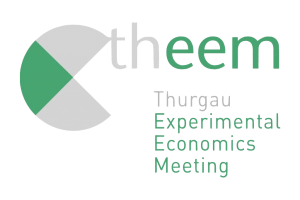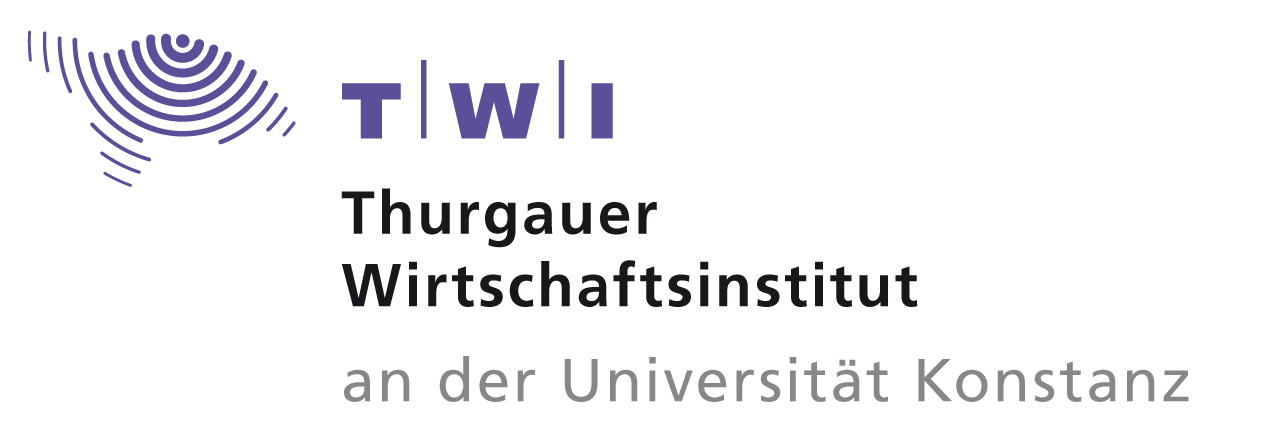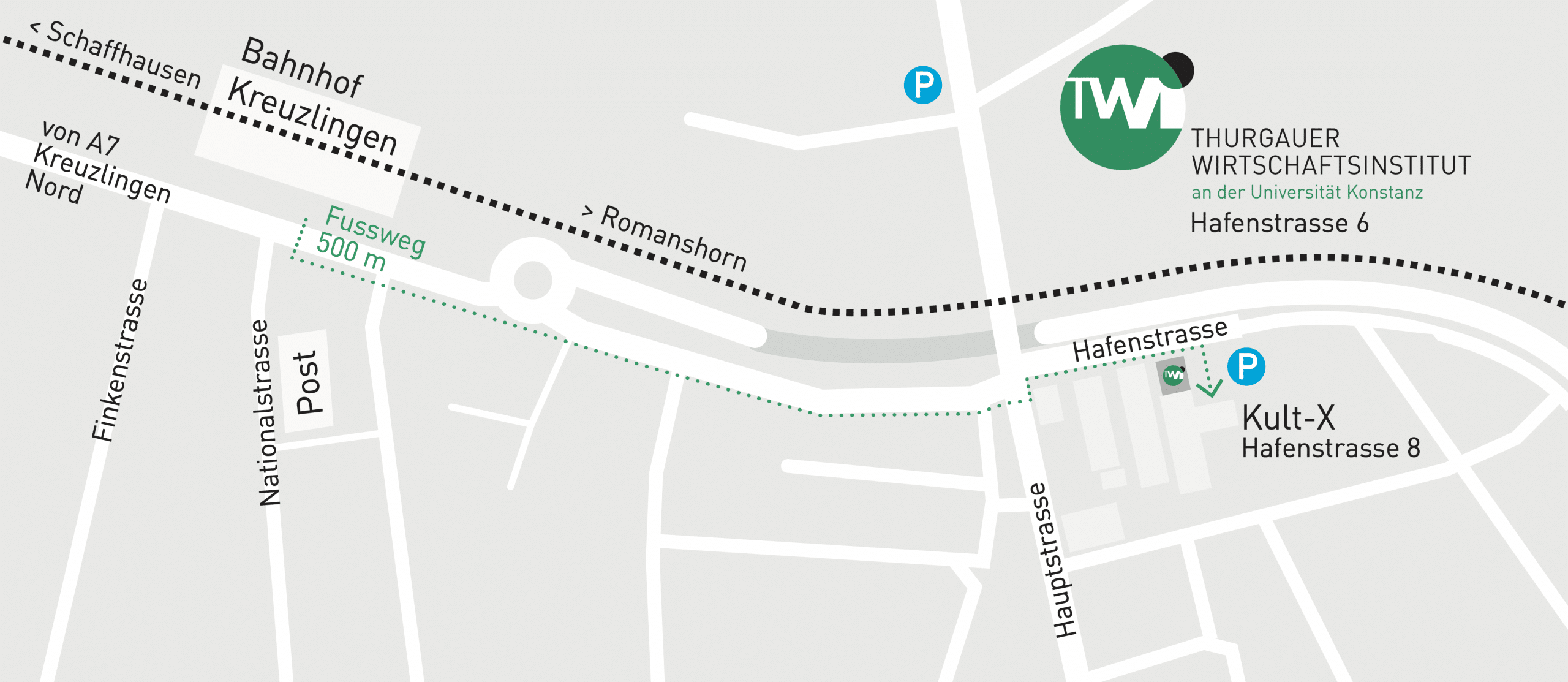12th Thurgau Experimental Economics Meeting (theem)

Technology and Human Behaviour
20th -22th March 2024, Kreuzlingen (CH)
Organized by the Thurgau Institute of Economics at the University of Konstanz
How does technology affect behaviour? Beyond the research on how technological progress affects large-scale trends like inequality, the labour market, and occupational segregation, recent interest has emerged about its impact on individual behaviour. This includes decisions related to educational investment and migration, as well as to preferences, beliefs, biases, political views, and inter-group attitudes. This year’s theem aims to bring together researchers working in this area with a focus on the use of experimental approaches. Topics of interest are broad and include technology adoption, digitisation, smart devices, virtual workplaces, workplace automation, artificial intelligence, cryptocurrencies, and robots. We welcome contributions from economics as well as other disciplines like psychology, political science, sociology, management, law, and computer science.
Keynote Speakers:
Gillian Kereldena Hadfield
Gillian K. Hadfield, B.A. (Hons.) Queens, J.D., M.A., Ph.D. (Economics) Stanford, is Professor of Law, Professor of Strategic Management and holds the Schwartz Reisman Chair in Technology and Society at the University of Toronto and a CIFAR AI Chair at the Vector Institute. She is the inaugural Director of the Schwartz Reisman Institute for Technology and Society. She has recently been named one of seven AI2050 Senior Fellows by Schmidt Futures. AI2050 is a program that advances Eric and Wendy Schmidt’s $125 million, five-year commitment to support talented individuals working to ensure AI’s benefit to society. Her current research is focused on innovative design for legal and regulatory systems for AI and other complex global technologies; computational models of human normative systems; and working with machine learning researchers to build ML systems that understand and respond to human norms. Professor Hadfield is a Faculty Affiliate at the Center for Human-Compatible AI at the University of California Berkeley and was a Senior Policy Advisor at OpenAI in San Francisco. Her book Rules for a Flat World: Why Humans Invented Law and How to Reinvent It for a Complex Global Economy was published by Oxford University Press in 2017; a paperback edition with a new prologue on AI was published in 2020 and an audiobook version released in 2021.
Alicia von Schenk
Alicia von Schenk was appointed as Junior Professor (TT) for Applied Microeconomics, especially Human-Machine Interaction, at the University of Würzburg in 2022 at the age of 26. After having studied both economics and mathematics (BSc & MSc), she did her PhD at the Goethe University Frankfurt and became postdoc at the Center for Humans and Machines (MPI) in Berlin in 2021. Her research combines questions of behavioral and organizational economics with current and socially relevant topics in the field of artificial intelligence and human-machine interaction. She uses experimental methods and causal inference together with machine learning applications, e.g., to answer questions about technology acceptance and the effect of algorithms on individuals‘ preferences and decision-making.
Important Dates:
| 21st January, 2024: | Submission deadline |
| 05th February, 2024: | Notification of acceptance |
| 19th February, 2024: | Registration deadline for presenters |
| 01st March, 2024: | Registration deadline for non-presenters |
| 20th March, 2024, 12:00 am: | Theem starts |
| 22nd March, 2024, 2:30 pm: | End of Theem (times are preliminary) |
If you would like to present your research, please submit an extended abstract (max. 2000 characters, or about 300 words) in .txt format below. The conference fee is EUR 200 (including coffee breaks and the conference dinner).
Organized by:
| Ankush Asri | Deepti Bhatia | Adrian Chadi | Fabian Dvorak | Holly Dykstra | Urs Fischbacher | Irenaeus Wolff |
Where to stay
http://www.hotelsix.ch/ (directly at the border between Germany and Switzerland)
www.hotel-kreuzlingen.ch (near the restaurant Alti Badi and PH Thurgau)
http://www.hotel-konstanz.com (a hotel near the border in Konstanz)
www.hotelbarbarossa.de (in the old city of Konstanz)
http://www.hotel-viva-sky.de (near main train station Konstanz)
www.cityhotel-konstanz.de (also very near to the main train station)
How to get to theem
Theem takes place at the Kult-X, Hafenstrasse 8, CH-8280 Kreuzlingen.
By train
You can get to Kreuzlingen by train with the SBB (https://www.sbb.ch). The final station is Kreuzlingen. You can reach the Thurgau Institute of Economics by bus line 924. Please get off the bus at the stop Bärenplatz. You can reach Konstanz by Deutsche Bahn (https://www.bahn.de). From the main station take bus line 908 to get to the Thurgau Institute of Economics. Please get off the bus at the stop Bärenplatz.
By car
You can get to Kreuzlingen from Zurich on highway N7. From the north you can get to Kreuzlingen on highway A81. Please follow direction Kreuzlingen centre. Parking is possible at Bärenplatz opposite the Thurgau Institute of Economics.
By plane
The international airport next to Kreuzlingen is Zurich Kloten. From Zurich Kloten there is a direct train connection taking about one hour to Kreuzlingen with the SBB (https://www.sbb.ch). The regional airport next to Kreuzlingen is Friedrichshafen. From Friedrichshafen situated on the north side of the Lake Constance you can get to Kreuzlingen by express bus, train or ship.


